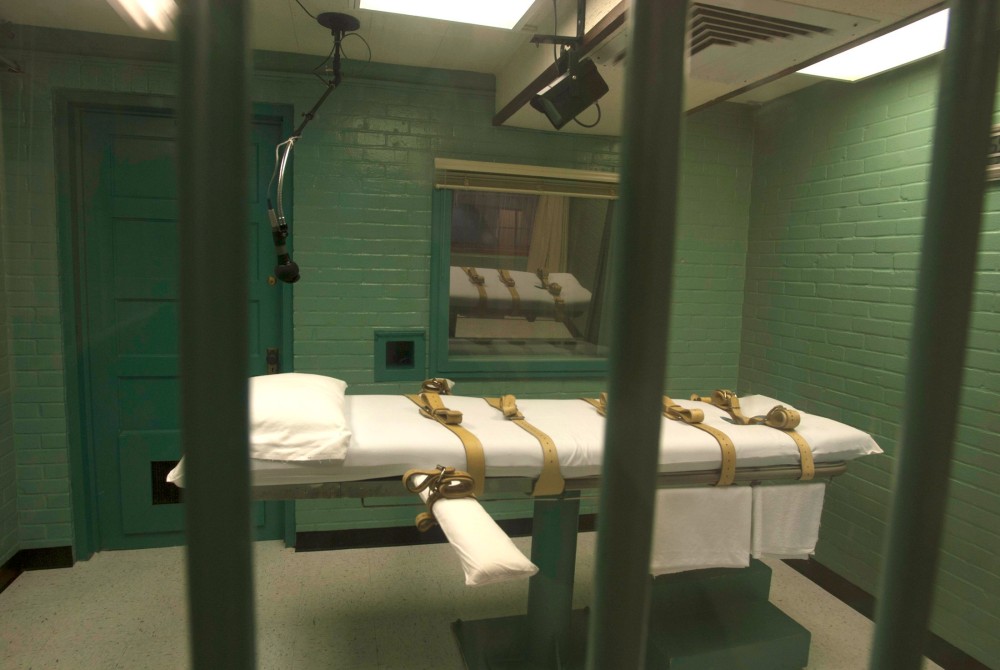
WASHINGTON – A federal judge ruled Jan. 10 that Alabama can execute a death row inmate with nitrogen gas in late January, which would make it the country’s first execution using this method that has been described by the inmate’s attorneys and a United Nations report as cruel and experimental.
U.S. District Judge R. Austin Huffaker rejected the preliminary injunction sought by inmate Kenneth Eugene Smith to stop his Jan. 25 execution by nitrogen hypoxia.
Smith, 58, was convicted in the 1988 murder-for-hire death of Elizabeth Sennett by her husband, an Alabama pastor, and has been on death row for more than 30 years. Two years ago, the state failed in its attempt to execute him by lethal injection because officials were unable to successfully set the IV lines for the injection drugs.
Smith’s case was retried in 1996 and a jury in an 11-1 vote recommended a life sentence without parole but a judge overruled this and sentenced Smith to death.
Smith’s attorney, Robert Grass, said the state is now trying to make Smith a “test subject” by using an untried execution method and said he plans to appeal the decision, which could ultimately come before the Supreme Court.
Three states — Alabama, Mississippi, and Oklahoma — have authorized nitrogen hypoxia as an execution method, but no state has used it so far. The execution method calls for placing a respirator-type face mask over the inmate’s nose and mouth to replace breathable air with nitrogen, causing the person to die from lack of oxygen.
When Oklahoma’s legislature passed the use of this method in 2018, Sister Helen Prejean, a Sister of St. Joseph and longtime death penalty opponent, said on social media: “The suggestion by authorities that this new method is ‘more humane’ ignores the fact that it is an untried method, human experimentation practiced by the state upon its citizens.”
“More importantly,” she said, using nitrogen gas in executions “ignores the unavoidable truths that there is no humane way to kill a conscious, thinking human being, and that the entire apparatus of capital punishment is deeply flawed and deeply wounding to us all.”
Sister Prejean and Catholic Mobilizing Network, a group that works to end the death penalty, posted on X, formerly Twitter, that Alabama was set to use nitrogen gas in its upcoming execution.
Catholic Mobililzing Network posted a release issued by the United Nations Human Rights Council earlier this month cautioning that this execution method would violate the prohibition on torture and other cruel, inhuman, or degrading punishment. They also said it would “result in a painful and humiliating death.”
In court arguments in December about this case, Smith’s attorneys argued that the use of nitrogen gas in the execution chamber was full of unknown variables and potential problems. They similarly said its use would violate a constitutional ban on cruel and unusual punishment.
In his ruling, the judge said the risks involved are not a constitutional violation.
Rev. Jeff Hood, a Baptist pastor and activist in Little Rock, Arkansas, who is Smith’s spiritual adviser and plans to be with Smith during the execution, was troubled by the court’s ruling. “Horror is an understatement. The State of Alabama now has the permission of a federal court to suffocate its citizens,” he told The Associated Press.
Last December, Hood filed a lawsuit claiming the state was violating his religious liberties by requiring him to be no closer than 3 feet to Smith in the execution chamber. The state has since agreed to allow him to be with Smith before his mask is affixed and that he can touch Smith during the execution, but the minister still has questions about his safety.
“If a nitrogen leak were to happen in the execution chamber, who will be there?” Hood asked during a news conference. He also asked: “What is the emergency procedure if I collapse?”
Smith’s attorneys also argued that the gas mask, which sits over the nose and mouth, would interfere with Smith’s ability to pray aloud or make a final death chamber statement.
An article this fall by the Death Penalty Information Center, based in Washington, said that the use of nitrogen gas in executions could endanger spiritual advisers and prison staff members in the execution chamber.
It said the state’s revised execution protocol permits spiritual advisers in the chamber only if they accept the risk of harm. The protocol states that “no spiritual adviser or alternate spiritual adviser shall be allowed in the execution chamber unless they review and sign the spiritual adviser nitrogen hypoxia acknowledgement form.”
